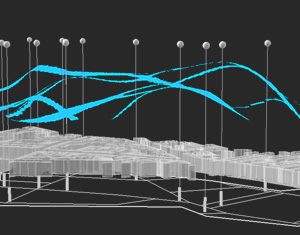Simulation of Spatio-Temporal Urban Processes
In an urban environment simultaneous processes start, rest, stop and influence each other. These processes vary in the fortitude of their outcomes. They appear on different scales, are of different natures, and have different recipients. Any adequate mapping of an urban process to a model must take this into account. Since it is impossible to deal with all of these intertwining processes, measures must be taken to consider them without modeling or analyzing them before the simulation.
In our work, we aim at concentrating on the uncertainties within the modeling of large-scale urban processes. Data uncertainties can stem from or be enlarged by measurement, collection, aggregation, transformation, communication, propagation, modeling, conceptualization, or aging of data. We want to identify the uncertainties within models and alter their rules in such a way that the sizes and types of uncertainties have an impact on the actual outcome of the result. The models will serve for different purposes, e.g., descriptive analysis or prediction. They will cover processes on various geographic, temporal, and thematic scales and tackle them with diverse policies and methods.
In the end, we want to deliver a better understanding of the validity of models and their results, to enforce greater concern with potential sources of error and seemingly random fluctuations, and to evaluate the usefulness of existing and, if necessary, develop new approaches to cope with uncertainties.
Funding: HCU DigitalCity Research Group
